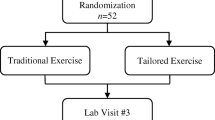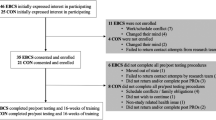Abstract
Introduction
Cancer-related fatigue is a most debilitating side effect reported by survivors, often lasting years following treatment.
Purpose
To determine the effects of a 10-week exercise intervention compared with a health education intervention on fatigue, quality of life outcomes and functional fitness in cancer survivors with documented fatigue.
Methods
This quasi-experimental study allocated 37 post-treatment fatigued cancer survivors (33 female, 30 breast cancer, aged 55 ± 2 years, time since treatment 2.3 ± 0.3 years; mean ± SEM) to an exercise group (EX, n = 19) or health education comparison group (HE, n = 18). The EX intervention emphasised brisk walking with progressive increments, stretching, exercise education and self-efficacy enhancement. The HE intervention emphasised sleep management, nutrition and cognitive behavioural therapy. All participants were evaluated at pre- and post-intervention with EX followed up at 26 W.
Results
The intervention effect on fatigue (FACT-F) in EX was greater (p < 0.05) than that in HE, the difference being 4 times the recognised clinically important difference. The intervention also increased (p < 0.05) cognitive function, global quality of life and functional fitness scores. It reduced (p < 0.05) insomnia and fear of physical activity. All intervention effects were maintained to 26 W. The intervention effect on fatigue in EX was largely achieved by week 4. There was 100% retention rate at 10 W and no adverse events reported.
Conclusions
There is a reduction of considerable magnitude in cancer fatigue from group-based exercise training, that is sustainable and attributable to exercise per se.
Implications for cancer survivors
Exercise training is feasible for fatigued cancer survivors and should form part of tailored rehabilitation programmes.


Similar content being viewed by others
References
Ryan JL, Carroll JK, Ryan EP, Mustian KM, Fiscella K, Morrow GR (2007) Mechanisms of cancer-related fatigue. Oncologist 12(Suppl 1):22–34. https://doi.org/10.1634/theoncologist.12-S1-22
Berger AM, Mooney K, Alvarez-Perez A, Breitbart WS, Carpenter KM, Cella D, Cleeland C, Dotan E, Eisenberger MA, Escalante CP, Jacobsen PB, Jankowski C, LeBlanc T, Ligibel JA, Loggers ET, Mandrell B, Murphy BA, Palesh O, Pirl WF, Plaxe SC, Riba MB, Rugo HS, Salvador C, Wagner LI, Wagner-Johnston ND, Zachariah FJ, Bergman MA, Smith C, National comprehensive cancer network (2015) Cancer-related fatigue, version 2.2015. J Natl Compr Cancer Netw 13(8):1012–1039
Gledhill J (2005) A qualitative study of the characteristics and representation of fatigue in a French speaking population of cancer patients and healthy subjects. Eur J Oncol Nurs 9(4):294–312; discussion 3-4. https://doi.org/10.1016/j.ejon.2004.11.002
Bower JE, Ganz PA, Desmond KA, Bernaards C, Rowland JH, Meyerowitz BE, Belin TR (2006) Fatigue in long-term breast carcinoma survivors: a longitudinal investigation. Cancer. 106(4):751–758. https://doi.org/10.1002/cncr.21671
Thong MS, Mols F, Wang XS, Lemmens VE, Smilde TJ, van de Poll-Franse LV (2013) Quantifying fatigue in (long-term) colorectal cancer survivors: a study from the population-based patient reported outcomes following initial treatment and long term evaluation of survivorship registry. Eur J Cancer 49(8):1957–1966. https://doi.org/10.1016/j.ejca.2013.01.012
Langston B, Armes J, Levy A, Tidey E, Ream E (2013) The prevalence and severity of fatigue in men with prostate cancer: a systematic review of the literature. Support Care Cancer 21(6):1761–1771. https://doi.org/10.1007/s00520-013-1751-5
Mehnert A (2011) Employment and work-related issues in cancer survivors. Crit Rev Oncol Hematol 77(2):109–130. https://doi.org/10.1016/j.critrevonc.2010.01.004
de Boer AG, Taskila T, Ojajarvi A, van Dijk FJ, Verbeek JH (2009) Cancer survivors and unemployment: a meta-analysis and meta-regression. JAMA. 301(7):753–762. https://doi.org/10.1001/jama.2009.187
Pryce J, Munir F, Haslam C (2007) Cancer survivorship and work: symptoms, supervisor response, co-worker disclosure and work adjustment. J Occup Rehabil 17(1):83–92. https://doi.org/10.1007/s10926-006-9040-5
Spelten ER, Verbeek JH, Uitterhoeve AL, Ansink AC, van der Lelie J, de Reijke TM, Kammeijer M, de Haes JC, Sprangers MA (2003) Cancer, fatigue and the return of patients to work-a prospective cohort study. Eur J Cancer 39(11):1562–1567
Buckwalter AE, Karnell LH, Smith RB, Christensen AJ, Funk GF (2007) Patient-reported factors associated with discontinuing employment following head and neck cancer treatment. Arch Otolaryngol Head Neck Surg 133(5):464–470. https://doi.org/10.1001/archotol.133.5.464
Cantarero-Villanueva I, Fernandez-Lao C, Cuesta-Vargas AI, Del Moral-Avila R, Fernandez-de-Las-Penas C, Arroyo-Morales M (2013) The effectiveness of a deep water aquatic exercise program in cancer-related fatigue in breast cancer survivors: a randomized controlled trial. Arch Phys Med Rehabil 94(2):221–230. https://doi.org/10.1016/j.apmr.2012.09.008
Courneya KS, Mackey JR, Bell GJ, Jones LW, Field CJ, Fairey AS (2003) Randomized controlled trial of exercise training in postmenopausal breast cancer survivors: cardiopulmonary and quality of life outcomes. J Clin Oncol 21(9):1660–1668. https://doi.org/10.1200/JCO.2003.04.093
Milne HM, Wallman KE, Gordon S, Courneya KS (2008) Effects of a combined aerobic and resistance exercise program in breast cancer survivors: a randomized controlled trial. Breast Cancer Res Treat 108(2):279–288. https://doi.org/10.1007/s10549-007-9602-z
Pinto BM, Frierson GM, Rabin C, Trunzo JJ, Marcus BH (2005) Home-based physical activity intervention for breast cancer patients. J Clin Oncol 23(15):3577–3587. https://doi.org/10.1200/JCO.2005.03.080
Burnham TR, Wilcox A (2002) Effects of exercise on physiological and psychological variables in cancer survivors. Med Sci Sports Exerc 34(12):1863–1867. https://doi.org/10.1249/01.MSS.0000040995.26076.CC
Cormie P, Newton RU, Spry N, Joseph D, Taaffe DR, Galvao DA (2013) Safety and efficacy of resistance exercise in prostate cancer patients with bone metastases. Prostate Cancer Prostatic Dis 16(4):328–335. https://doi.org/10.1038/pcan.2013.22
Ergun M, Eyigor S, Karaca B, Kisim A, Uslu R (2013) Effects of exercise on angiogenesis and apoptosis-related molecules, quality of life, fatigue and depression in breast cancer patients. Eur J Cancer Care (Engl) 22(5):626–637. https://doi.org/10.1111/ecc.12068
McNeely ML, Parliament MB, Seikaly H, Jha N, Magee DJ, Haykowsky MJ, Courneya KS (2008) Effect of exercise on upper extremity pain and dysfunction in head and neck cancer survivors: a randomized controlled trial. Cancer 113(1):214–222. https://doi.org/10.1002/cncr.23536
Pinto BM, Clark MM, Maruyama NC, Feder SI (2003) Psychological and fitness changes associated with exercise participation among women with breast cancer. Psychooncology. 12(2):118–126. https://doi.org/10.1002/pon.618
Pinto BM, Papandonatos GD, Goldstein MG, Marcus BH, Farrell N (2013) Home-based physical activity intervention for colorectal cancer survivors. Psychooncology. 22(1):54–64. https://doi.org/10.1002/pon.2047
Saarto T, Penttinen HM, Sievanen H, Kellokumpu-Lehtinen PL, Hakamies-Blomqvist L, Nikander R et al (2012) Effectiveness of a 12-month exercise program on physical performance and quality of life of breast cancer survivors. Anticancer Res 32(9):3875–3884
Thorsen L, Skovlund E, Stromme SB, Hornslien K, Dahl AA, Fossa SD (2005) Effectiveness of physical activity on cardiorespiratory fitness and health-related quality of life in young and middle-aged cancer patients shortly after chemotherapy. J Clin Oncol 23(10):2378–2388. https://doi.org/10.1200/JCO.2005.04.106
Winters-Stone KM, Dobek J, Bennett JA, Nail LM, Leo MC, Schwartz A (2012) The effect of resistance training on muscle strength and physical function in older, postmenopausal breast cancer survivors: a randomized controlled trial. J Cancer Surviv 6(2):189–199. https://doi.org/10.1007/s11764-011-0210-x
Cramp F, Byron-Daniel J (2012) Exercise for the management of cancer-related fatigue in adults. Cochrane Database Syst Rev 11:CD006145. https://doi.org/10.1002/14651858.CD006145.pub3
Tian L, Lu HJ, Lin L, Hu Y (2016) Effects of aerobic exercise on cancer-related fatigue: a meta-analysis of randomized controlled trials. Support Care Cancer 24(2):969–983. https://doi.org/10.1007/s00520-015-2953-9
Knols R, Aaronson NK, Uebelhart D, Fransen J, Aufdemkampe G (2005) Physical exercise in cancer patients during and after medical treatment: a systematic review of randomized and controlled clinical trials. J Clin Oncol 23(16):3830–3842. https://doi.org/10.1200/JCO.2005.02.148
Yellen SB, Cella DF, Webster K, Blendowski C, Kaplan E (1997) Measuring fatigue and other anemia-related symptoms with the Functional Assessment of Cancer Therapy (FACT) measurement system. J Pain Symptom Manag 13(2):63–74
Kenney WL (1995) ACSM’S guidelines for exercise testing and perscription. ACSM’S guidelines for exercise testing and perscription. Williams & Wilkins, Baltimore, pp 158–170
Cella D, Eton DT, Lai JS, Peterman AH, Merkel DE (2002) Combining anchor and distribution-based methods to derive minimal clinically important differences on the Functional Assessment of Cancer Therapy (FACT) anemia and fatigue scales. J Pain Symptom Manag 24(6):547–561
Aaronson NK, Ahmedzai S, Bergman B, Bullinger M, Cull A, Duez NJ et al (1993) The European Organization for Research and Treatment of Cancer QLQ-C30: a quality-of-life instrument for use in international clinical trials in oncology. J Natl Cancer Inst 85(5):365–376
Sander AP, Elliot L, Newsome C, Roach J, Tasche L (2011) Development and content validation of a scale to measure fear of physical activity and exercise in the breast cancer population. Rehabil Oncol 29:17–22. https://doi.org/10.1097/01893697-201129010-00003
Morin CM, Belleville G, Belanger L, Ivers H (2011) The Insomnia Severity Index: psychometric indicators to detect insomnia cases and evaluate treatment response. Sleep. 34(5):601–608
Yang M, Morin CM, Schaefer K, Wallenstein GV (2009) Interpreting score differences in the Insomnia Severity Index: using health-related outcomes to define the minimally important difference. Curr Med Res Opin 25(10):2487–2494. https://doi.org/10.1185/03007990903167415
Milton K, Bull FC, Bauman A (2011) Reliability and validity testing of a single-item physical activity measure. Br J Sports Med 45(3):203–208. https://doi.org/10.1136/bjsm.2009.068395
Minton O, Stone P (2009) A systematic review of the scales used for the measurement of cancer-related fatigue (CRF). Ann Oncol 20(1):17–25. https://doi.org/10.1093/annonc/mdn537
Goldstein D, Bennett BK, Webber K, Boyle F, de Souza PL, Wilcken NR, Scott EM, Toppler R, Murie P, O’Malley L, McCourt J, Friedlander M, Hickie IB, Lloyd AR (2012) Cancer-related fatigue in women with breast cancer: outcomes of a 5-year prospective cohort study. J Clin Oncol 30(15):1805–1812. https://doi.org/10.1200/JCO.2011.34.6148
Osoba D, Rodrigues G, Myles J, Zee B, Pater J (1998) Interpreting the significance of changes in health-related quality-of-life scores. J Clin Oncol 16(1):139–144. https://doi.org/10.1200/JCO.1998.16.1.139
Petrick JL, Foraker RE, Kucharska-Newton AM, Reeve BB, Platz EA, Stearns SC, Han X, Windham BG, Irwin DE (2014) Trajectory of overall health from self-report and factors contributing to health declines among cancer survivors. Cancer Causes Control 25(9):1179–1186. https://doi.org/10.1007/s10552-014-0421-3
Brown JC, Harhay MO, Harhay MN (2015) Physical function as a prognostic biomarker among cancer survivors. Br J Cancer 112(1):194–198. https://doi.org/10.1038/bjc.2014.568
Savard J, Morin CM (2001) Insomnia in the context of cancer: a review of a neglected problem. J Clin Oncol 19:895–908
Okuyama T, Akechi T, Kugaya A, Okamura H, Imoto S, Nakano T, Mikami I, Hosaka T, Uchitomi Y (2000) Factors correlated with fatigue in disease-free breast cancer patients: application of the Cancer Fatigue Scale. Support Care Cancer 8(3):215–222
Sandler CX, Goldstein D, Horsfield S, Bennett BK, Friedlander M, Bastick PA, Lewis CR, Segelov E, Boyle FM, Chin MTM, Webber K, Barry BK, Lloyd AR (2017) Randomized evaluation of cognitive-behavioral therapy and graded exercise therapy for post-cancer fatigue. J Pain Symptom Manag 54(1):74–84. https://doi.org/10.1016/j.jpainsymman.2017.03.015
Acknowledgements
We are grateful to Dr. Miriam O’Connor, Dr. Anne Horgan, Dr. Paula Calvert and Dr. Brian Creedon, University Hospital Waterford, and to the Solas Cancer Support Centre, Waterford, for supporting this study and for their assistance with participant recruitment.
Funding
This study was funded under the 2014 Waterford Institute of Technology PhD Scholarship scheme.
Author information
Authors and Affiliations
Corresponding author
Ethics declarations
Conflict of interest
The authors declare that they have no conflict of interest.
Ethical approval
All procedures performed in this study were in accordance with the ethical standards of the institutional research committee and with the 1964 Helsinki declaration and its later amendments or comparable ethical standards. This article does not contain any studies with animals.
Informed consent
Informed consent was obtained from all individual participants included in the study.
Additional information
Publisher’s note
Springer Nature remains neutral with regard to jurisdictional claims in published maps and institutional affiliations.
Rights and permissions
About this article
Cite this article
Sheehan, P., Denieffe, S., Murphy, N.M. et al. Exercise is more effective than health education in reducing fatigue in fatigued cancer survivors. Support Care Cancer 28, 4953–4962 (2020). https://doi.org/10.1007/s00520-020-05328-w
Received:
Accepted:
Published:
Issue Date:
DOI: https://doi.org/10.1007/s00520-020-05328-w




